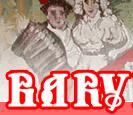 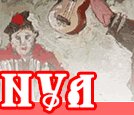  
New York Philharmonic. Shostakovich Symphony No 4.
Conductor Andrey Boreyko. Host Gerard McBurney.
December 12, 13, 14, 15, 2007. Avery Fisher Hall.
 Is Music Dangerous? Few composers have struggled under such oppression and personal danger, and created such powerful expressions of their struggle as did Shostakovich in the time of Stalin.
Is Music Dangerous? Few composers have struggled under such oppression and personal danger, and created such powerful expressions of their struggle as did Shostakovich in the time of Stalin.
Hear Andrey Boreyko lead the New York Philharmonic in Shostakovich's defiant Fourth Symphony.
December 12, 13, 14, 15, 2007 at Avery Fisher Hall.
And for one night only, join host Gerard McBurney as he tells the dramatic story of Shostakovich, through rare archival film footage and vivid first-hand accounts. Discover how writing this symphony became an act of courage for Shostakovich that moves and inspires us to this day. Then, enjoy the full performance as Andrey Boreyko leads the New York Philharmonic in the immortal Fourth Symphony.
Friday December 14 at Avery Fisher Hall.
Order your tickets on-line at www.nyphil.org, or call 212-875-5656.
DMITRI SHOSTAKOVICH (1906-1975)
Symphony No. 4 (1935-1936)
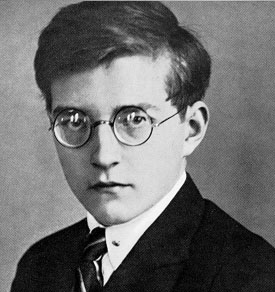 Leningrad, December 11, 1936: "Composer Shostakovich appealed to the Leningrad Philharmonic with the request to withdraw his Fourth Symphony from performance on the grounds that it in no way corresponds to his current creative convictions and represents for him a long outdated phase." That's the last that would be heard of the Fourth until 1961, when it would finally be premiered by the Moscow Philharmonic Orchestra under Kiril Kondrashin. The creation of the Symphony No. 4, begun in 1935, came upon the heels of Shostakovich's popular opera Lady Macbeth of the Mtsensk District, which was selling out the opera houses of Moscow and Leningrad. Then, in January 1936, without warning, Pravda published an official condemnation of the opera, under the title "Chaos Instead of Music." It seems Stalin had attended a performance and found it not to his liking. The opera was withdrawn. And while Shostakovich waited for the other shoe to drop, he completed his Fourth Symphony and planned for its premiere under Fritz Stiedry, chief conductor of the Leningrad Philharmonic (and for the US premiere under Otto Klemperer). Then, mysteriously, Shostakovich announced the withdrawal of his work in December 1936. Explanations vary as to what really happened, but it seems unlikely that Shostakovich would voluntarily have withdrawn his nearly-completed symphony. Leningrad, December 11, 1936: "Composer Shostakovich appealed to the Leningrad Philharmonic with the request to withdraw his Fourth Symphony from performance on the grounds that it in no way corresponds to his current creative convictions and represents for him a long outdated phase." That's the last that would be heard of the Fourth until 1961, when it would finally be premiered by the Moscow Philharmonic Orchestra under Kiril Kondrashin. The creation of the Symphony No. 4, begun in 1935, came upon the heels of Shostakovich's popular opera Lady Macbeth of the Mtsensk District, which was selling out the opera houses of Moscow and Leningrad. Then, in January 1936, without warning, Pravda published an official condemnation of the opera, under the title "Chaos Instead of Music." It seems Stalin had attended a performance and found it not to his liking. The opera was withdrawn. And while Shostakovich waited for the other shoe to drop, he completed his Fourth Symphony and planned for its premiere under Fritz Stiedry, chief conductor of the Leningrad Philharmonic (and for the US premiere under Otto Klemperer). Then, mysteriously, Shostakovich announced the withdrawal of his work in December 1936. Explanations vary as to what really happened, but it seems unlikely that Shostakovich would voluntarily have withdrawn his nearly-completed symphony.
According to Isaak Glikman, a friend of the composer's, during one of the rehearsals, there was a visit from "the Secretary of the Composer's Union, V. E. Iokhelson, accompanied by another important figure from the local Party HQ. Shortly afterwards, the director of the Philharmonic, I. M. Renzin, politely invited Dmitri Dmitryevich to his office. On the way home, Shostakovich was silent for a long while, finally saying in an even but toneless voice that the symphony would not be performed; it had been withdrawn on Renzin's recommendation." Rumors had been flying that Shostakovich was flouting his critics and writing a symphony full of the vilified "formalisms" that were the enemy of good Soviet music. The fact is that the Fourth is a product of the time of the Great Terror-the purges of hundreds of thousands of citizens-and the dark, ominous score reflect this terror. The required orchestral forces of more than 100 musicians, as well as its length and some content make it reminiscent of Mahler's vast symphonies. Its three movements encompass everything from "Landler-like" dance melodies to a funeral march, to blistering blasts by all players, to the shattering coda, when the lone celesta dies away into a bleak abyss.
GERARD MCBURNEY, host, born in 1954, in Cambridge, England
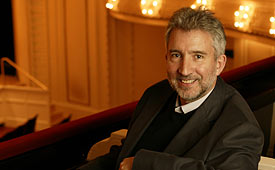 Gerard McBurney studied in his native England and at the Moscow Conservatory before returning to London, where he worked for many years as a composer, arranger, broadcaster, teacher, and writer. In addition to creating original compositions, he has reconstructed lost and forgotten works by Shostakovich, and has published widely in the field of Russian and Soviet music. For 20 years he created and presented programs on BBC Radio 3, and wrote and researched nearly 30 television documentaries. Mr. McBurney was a lecturer at the Royal Academy of Music in London for 12 years, and has acted as advisor and collaborator with many orchestras and presenters, including Lincoln Center, the Emerson Quartet, the Halle Orchestra, and the Los Angeles Philharmonic.
Gerard McBurney studied in his native England and at the Moscow Conservatory before returning to London, where he worked for many years as a composer, arranger, broadcaster, teacher, and writer. In addition to creating original compositions, he has reconstructed lost and forgotten works by Shostakovich, and has published widely in the field of Russian and Soviet music. For 20 years he created and presented programs on BBC Radio 3, and wrote and researched nearly 30 television documentaries. Mr. McBurney was a lecturer at the Royal Academy of Music in London for 12 years, and has acted as advisor and collaborator with many orchestras and presenters, including Lincoln Center, the Emerson Quartet, the Halle Orchestra, and the Los Angeles Philharmonic.
ANDREY BOREYKO, conductor, born in 1957 in Leningrad (now St. Petersburg), Russia
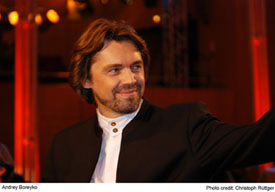 Russian conductor Andrey Boreyko is one of the most exciting and dynamic conductors to emerge from Eastern Europe in recent years. His strong interest in music of the first half of the 20th century, as well as that of more recent years, has led him to collaborations with composers such as Henryk Gorecki, Sofia Gubaidulina, and Arvo Part, among many others, and his discography includes the music of Ginastera, Takemitsu, Part, and Silvestrov. Studying new scores or scores new to him is an important part of his life: "I am studying Grieg's Symphony which I will conduct for the very first time in a few weeks, and am also working on Boris Blacher's Musica concertante, and a new work by Arvo Part, La Sindone, which I will premiere in Switzerland this season." This dedication to music of our time was recognized by the German Music Critics Union when he received the prize for most innovative concert programming in 1999-2000, 2000-2001, and 2002-2003-an unprecedented achievement in the history of this award.
Russian conductor Andrey Boreyko is one of the most exciting and dynamic conductors to emerge from Eastern Europe in recent years. His strong interest in music of the first half of the 20th century, as well as that of more recent years, has led him to collaborations with composers such as Henryk Gorecki, Sofia Gubaidulina, and Arvo Part, among many others, and his discography includes the music of Ginastera, Takemitsu, Part, and Silvestrov. Studying new scores or scores new to him is an important part of his life: "I am studying Grieg's Symphony which I will conduct for the very first time in a few weeks, and am also working on Boris Blacher's Musica concertante, and a new work by Arvo Part, La Sindone, which I will premiere in Switzerland this season." This dedication to music of our time was recognized by the German Music Critics Union when he received the prize for most innovative concert programming in 1999-2000, 2000-2001, and 2002-2003-an unprecedented achievement in the history of this award.
He is chief conductor of the Hamburg and the Bern symphony orchestras; he has guest-conducted the great orchestras of Europe and Australia, and is making his American debuts at Chicago, Philadelphia, and now with the New York Philharmonic. "I'm looking forward to finding at the Philharmonic a group of excellent musicians with whom I can share and communicate my understanding of music and a shared and harmonious collaboration," says Andrey Boreyko in anticipation. Despite his busy schedule, he finds time for other activities: "I enjoying reading, researching, finding and listening to all types of music that I have not previously encountered. I spend time thinking about new programs and am always keeping in touch with people by e-mail. At the moment I'm reading Anthony Burgess's Man of Nazareth, Pavel Muratov's Images of Italy, Bernard Werber's Empire of the Ants, and Helene Grimaud's Wild Harmonies: A Life of Music and Wolves. All at the same time, believe or not!"
"Maestro Boreyko gave his orchestra the chance to give a brilliant performance in all aspects. Boreyko certainly set a new benchmark. Standing ovations and stamping for him and his absolutely splendid orchestra."
Hamburger Abendblatt
"Boreyko seems destined to rise to the top of the profession on both sides of the Atlantic."
Music in Cincinnati
ADVERTISEMENT
Russian American singles dance party on the boat
Marco Polo "Lucille", New York Skyports, East 23rd Street & FDR
New York City, Friday, July 18, 2008, from 7 pm to 11 PM
DJ BARNAUL will play mix of popular European, Russian, American music of 80th, 90th and current hits. Guest performer Belly dancer Angela. Both DJ and dancer are available for clubs and restaurants. ADMISSION $50 INCLUDES SNACKS, FRUIT BAR. LIMITED TICKETS. RESERVE BEFORE JULY 10. To buy tickets on-line go to www.RussianDJ.mobi
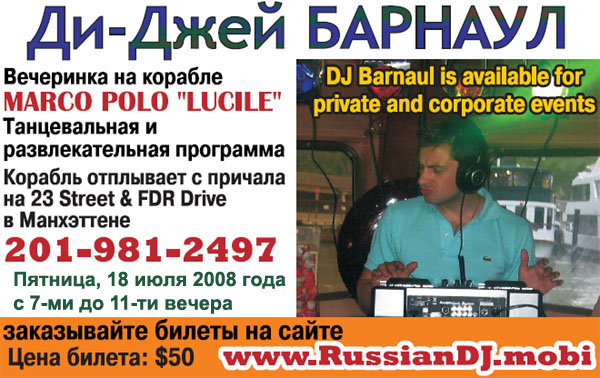
|
Russian New Year's characters Father Frost and Snow Maiden
Ded Moroz and Snegurochka (Russian: Дед Мороз и Снегурочка)
Father Frost and Snow Maiden are the most important characters of the New Year's celebration in Russia. Father Frost (Ded Moroz, Russian: Дед Мороз) plays a role similar to that of Santa Claus. The literal translation of the name would be "Grandfather Frost". However, English-speakers traditionally translate "DED MOROZ" as the alliterative "FATHER FROST". Ded Moroz is always accompanied by his granddaughter Snegurochka - Snow Maiden (Russian: Снегурочка).
New York based ensemble Barynya created a special Russian New Year's program with traditional Russian winter songs, dances and music: "In the forest a fir-tree was born" (V Lesu Rodilas' Yolochka), "Small Fir Tree is Freezing during the Winter" (Malen'koi Yolochke Kholdno Zimoy), "The snowstorm is blowing along the street" (Metelitsa), "Father Frost" (Moroz-Moroz), "Five minutes" (Pyat' Minut).
Ded Moroz and Snegurochka are available for hire in New York, New Jersey, Connecticut and Pennsylvania (within 100 miles driving distance from New York City). For a fast price quote contact Mikhail Smirnov
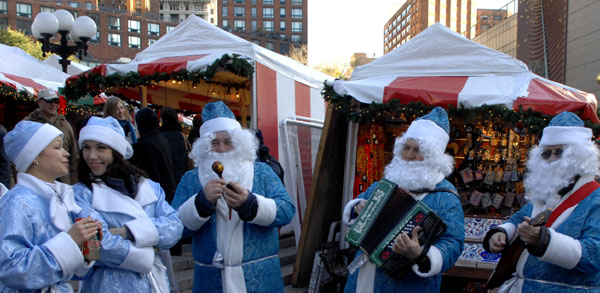
Father Frost and Snow Maiden - Ded Moroz and Snegurochka in New York City - photos
|
|
January 25, 26, 2008
Zhenya Shevchenko
Ensemble Barynya

more info
The Kaye playhouse
Hunter College
New York City
ORDER TICKETS
|
|






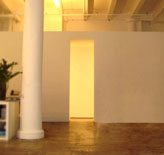


 Leningrad, December 11, 1936: "Composer Shostakovich appealed to the Leningrad Philharmonic with the request to withdraw his Fourth Symphony from performance on the grounds that it in no way corresponds to his current creative convictions and represents for him a long outdated phase." That's the last that would be heard of the Fourth until 1961, when it would finally be premiered by the Moscow Philharmonic Orchestra under Kiril Kondrashin. The creation of the Symphony No. 4, begun in 1935, came upon the heels of Shostakovich's popular opera Lady Macbeth of the Mtsensk District, which was selling out the opera houses of Moscow and Leningrad. Then, in January 1936, without warning, Pravda published an official condemnation of the opera, under the title "Chaos Instead of Music." It seems Stalin had attended a performance and found it not to his liking. The opera was withdrawn. And while Shostakovich waited for the other shoe to drop, he completed his Fourth Symphony and planned for its premiere under Fritz Stiedry, chief conductor of the Leningrad Philharmonic (and for the US premiere under Otto Klemperer). Then, mysteriously, Shostakovich announced the withdrawal of his work in December 1936. Explanations vary as to what really happened, but it seems unlikely that Shostakovich would voluntarily have withdrawn his nearly-completed symphony.
Leningrad, December 11, 1936: "Composer Shostakovich appealed to the Leningrad Philharmonic with the request to withdraw his Fourth Symphony from performance on the grounds that it in no way corresponds to his current creative convictions and represents for him a long outdated phase." That's the last that would be heard of the Fourth until 1961, when it would finally be premiered by the Moscow Philharmonic Orchestra under Kiril Kondrashin. The creation of the Symphony No. 4, begun in 1935, came upon the heels of Shostakovich's popular opera Lady Macbeth of the Mtsensk District, which was selling out the opera houses of Moscow and Leningrad. Then, in January 1936, without warning, Pravda published an official condemnation of the opera, under the title "Chaos Instead of Music." It seems Stalin had attended a performance and found it not to his liking. The opera was withdrawn. And while Shostakovich waited for the other shoe to drop, he completed his Fourth Symphony and planned for its premiere under Fritz Stiedry, chief conductor of the Leningrad Philharmonic (and for the US premiere under Otto Klemperer). Then, mysteriously, Shostakovich announced the withdrawal of his work in December 1936. Explanations vary as to what really happened, but it seems unlikely that Shostakovich would voluntarily have withdrawn his nearly-completed symphony.
 Gerard McBurney studied in his native England and at the Moscow Conservatory before returning to London, where he worked for many years as a composer, arranger, broadcaster, teacher, and writer. In addition to creating original compositions, he has reconstructed lost and forgotten works by Shostakovich, and has published widely in the field of Russian and Soviet music. For 20 years he created and presented programs on BBC Radio 3, and wrote and researched nearly 30 television documentaries. Mr. McBurney was a lecturer at the Royal Academy of Music in London for 12 years, and has acted as advisor and collaborator with many orchestras and presenters, including Lincoln Center, the Emerson Quartet, the Halle Orchestra, and the Los Angeles Philharmonic.
Gerard McBurney studied in his native England and at the Moscow Conservatory before returning to London, where he worked for many years as a composer, arranger, broadcaster, teacher, and writer. In addition to creating original compositions, he has reconstructed lost and forgotten works by Shostakovich, and has published widely in the field of Russian and Soviet music. For 20 years he created and presented programs on BBC Radio 3, and wrote and researched nearly 30 television documentaries. Mr. McBurney was a lecturer at the Royal Academy of Music in London for 12 years, and has acted as advisor and collaborator with many orchestras and presenters, including Lincoln Center, the Emerson Quartet, the Halle Orchestra, and the Los Angeles Philharmonic.
 Russian conductor Andrey Boreyko is one of the most exciting and dynamic conductors to emerge from Eastern Europe in recent years. His strong interest in music of the first half of the 20th century, as well as that of more recent years, has led him to collaborations with composers such as Henryk Gorecki, Sofia Gubaidulina, and Arvo Part, among many others, and his discography includes the music of Ginastera, Takemitsu, Part, and Silvestrov. Studying new scores or scores new to him is an important part of his life: "I am studying Grieg's Symphony which I will conduct for the very first time in a few weeks, and am also working on Boris Blacher's Musica concertante, and a new work by Arvo Part, La Sindone, which I will premiere in Switzerland this season." This dedication to music of our time was recognized by the German Music Critics Union when he received the prize for most innovative concert programming in 1999-2000, 2000-2001, and 2002-2003-an unprecedented achievement in the history of this award.
Russian conductor Andrey Boreyko is one of the most exciting and dynamic conductors to emerge from Eastern Europe in recent years. His strong interest in music of the first half of the 20th century, as well as that of more recent years, has led him to collaborations with composers such as Henryk Gorecki, Sofia Gubaidulina, and Arvo Part, among many others, and his discography includes the music of Ginastera, Takemitsu, Part, and Silvestrov. Studying new scores or scores new to him is an important part of his life: "I am studying Grieg's Symphony which I will conduct for the very first time in a few weeks, and am also working on Boris Blacher's Musica concertante, and a new work by Arvo Part, La Sindone, which I will premiere in Switzerland this season." This dedication to music of our time was recognized by the German Music Critics Union when he received the prize for most innovative concert programming in 1999-2000, 2000-2001, and 2002-2003-an unprecedented achievement in the history of this award.
